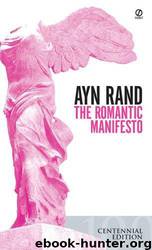The romantic manifesto: a philosophy of literature by Ayn Rand

Author:Ayn Rand
Language: eng
Format: mobi
Tags: Criticism, Literature, Aesthetics, Philosophy, General, Literary Criticism, Modern, Semiotics & Theory, History & Surveys, Literature - Philosophy
ISBN: 9780451149169
Publisher: Penguin
Published: 1975-01-15T04:57:55.754680+00:00
(May-July 1969)
7.
The Esthetic Vacuum of Our Age
PRIOR to the nineteenth century, literature presented man as a helpless being whose life and actions were determined by forces beyond his control: either by fate and the gods, as in the Greek tragedies, or by an innate weakness, “a tragic flaw,” as in the plays of Shakespeare. Writers regarded man as metaphysically impotent; their basic premise was determinism. On that premise, one could not project what might happen to men; one could only record what did happen—and chronicles were the appropriate literary form of such recording.
Man as a being who possesses the faculty of volition did not appear in literature until the nineteenth century. The novel was his proper literary form—and Romanticism was the great new movement in art. Romanticism saw man as a being able to choose his values, to achieve his goals, to control his own existence. The Romantic writers did not record the events that had happened, but projected the events that should happen; they did not record the choices men had made, but projected the choices men ought to make.
With the resurgence of mysticism and collectivism, in the later part of the nineteenth century, the Romantic novel and the Romantic movement vanished gradually from the cultural scene.
Man’s new enemy, in art, was Naturalism. Naturalism rejected the concept of volition and went back to a view of man as a helpless creature determined by forces beyond his control; only now the new ruler of man’s destiny was held to be society. The Naturalists proclaimed that values have no power and no place, neither in human life nor in literature, that writers must present men “as they are,” which meant: must record whatever they happen to see around them—that they must not pronounce value-judgments nor project abstractions, but must content themselves with a faithful transcription, a carbon copy, of any existing concretes.
This was a return to the literary principle of the chronicle—but since a novel was to be an invented chronicle, the novelist was faced with the problem of what to use as his standard of selection. When values are declared to be impossible, how is one to know what to record, what to regard as important or significant? Naturalism solved the problem by substituting statistics for a standard of value. That which could be claimed to be typical of a large number of men, in any given geographical area or period of time, was regarded as metaphysically significant and worthy of being recorded. That which was rare, unusual, exceptional, was regarded as unimportant and unreal.
Just as the new schools of philosophy became progressively dedicated to the negation of philosophy, so Naturalism was dedicated to the negation of art. Instead of presenting a metaphysical view of man and of existence, the Naturalists presented a journalistic view. In answer to the question: “What is man?”—they said: “This is what the village grocers are, in the south of France, in the year 1887,” or: “This is what the inhabitants of the slums are, in New York, in 1921,” or: “These are the folks next door.
Download
This site does not store any files on its server. We only index and link to content provided by other sites. Please contact the content providers to delete copyright contents if any and email us, we'll remove relevant links or contents immediately.
| Ancient & Classical | Arthurian Romance |
| Beat Generation | Feminist |
| Gothic & Romantic | LGBT |
| Medieval | Modern |
| Modernism | Postmodernism |
| Renaissance | Shakespeare |
| Surrealism | Victorian |
4 3 2 1: A Novel by Paul Auster(12392)
The handmaid's tale by Margaret Atwood(7763)
Giovanni's Room by James Baldwin(7346)
Asking the Right Questions: A Guide to Critical Thinking by M. Neil Browne & Stuart M. Keeley(5775)
Big Magic: Creative Living Beyond Fear by Elizabeth Gilbert(5771)
Ego Is the Enemy by Ryan Holiday(5448)
The Body: A Guide for Occupants by Bill Bryson(5096)
On Writing A Memoir of the Craft by Stephen King(4944)
Ken Follett - World without end by Ken Follett(4732)
Adulting by Kelly Williams Brown(4574)
Bluets by Maggie Nelson(4556)
Eat That Frog! by Brian Tracy(4540)
Guilty Pleasures by Laurell K Hamilton(4449)
The Poetry of Pablo Neruda by Pablo Neruda(4107)
Alive: The Story of the Andes Survivors by Piers Paul Read(4032)
White Noise - A Novel by Don DeLillo(4009)
Fingerprints of the Gods by Graham Hancock(4004)
The Book of Joy by Dalai Lama(3986)
The Bookshop by Penelope Fitzgerald(3853)
